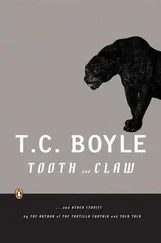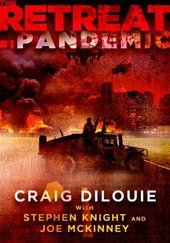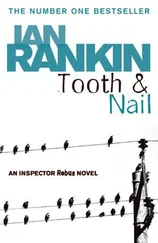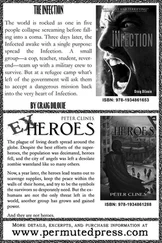The NCOs stop smiling. If military units in the area stop being supplied, then eventually they will start looting to survive, and once an army crosses that line, they cease being an army and become a rabble—part of the problem, not the solution.
Bowman adds, “Meanwhile, Dixon’s low on food, ammo and fuel, he has a man down out of every four, and he’s now governor and de facto chief of police of an island with nearly five hundred thousand people on it. That’s a half a million people getting hungrier, sicker and more pissed off by the minute.”
The sergeants bury their faces in their coffee mugs, chastened. Bowman returns to the map, pointing at police stations where at least a few cops are trying to hold it together, Financial District and municipal buildings occupied by ragtag National Guard units and the Brigade’s civilian affairs unit, a bridge still held by military police and engineers, and Twenty-Six Federal Plaza, where a handful of FBI agents, immigration officials, Federal judges and their families are apparently holed up. Manhattan is riddled with islands and pockets of friendly units, but nobody is strong enough to link up with anybody else or project their power. The marines at Battery Park might as well be on the Moon. The only real estate any of these units truly controls is right under their feet.
McGraw believes there could be up to fifty, even a hundred thousand Mad Dogs in Manhattan alone. The population grew fast because the problem started mostly in the hospitals and there were thousands upon thousands of people there, lying helpless and easily infected, like tightly packed kindling awaiting a spark. The good news is the Mad Dog population does not appear to be growing as fast as it was. The hospitals have been emptied and most people are staying home, denying the virus a plentiful source of new bodies. In any case, the Mad Dogs now appear to be concentrated into sizable mobs that often end up killing anybody they come into contact with instead of infecting them. Soon, the number of Mad Dogs on the streets is going to start declining as they suffer a massive die-off. The war might end soon if everybody just stays hidden and waits.
Somebody asks about the three yellow boxes in Brooklyn and Queens.
“I was getting to them,” Bowman answers. “As far as I can tell, they’re deserters. Nothing bigger than a platoon at this point, but it’s another thing that Twenty-Fifth Brigade has to worry about that’s out there.”
The sergeants glance at each other. The country must really be on the brink of collapse if the Army is starting to fall apart.
But the real problem isn’t people leaving the Army, the LT tells them.
He adds quickly: “The real problem, it seems, is the Army leaving us.”
His finger traces along Brooklyn’s western coast, a long green smear.
“This is Second Battalion, Twenty-Fifth Brigade, commanded by Colonel Guzman. He’s in a good position.”
Another green smear along the north coast of Queens.
“This is two companies of First Battalion, Twenty-Fifth Brigade, commanded by Colonel Powers. He took a real beating last night and is barely holding it together.”
He points at a red X in the South Bronx.
“This is the last known position of the other two companies of First Battalion, Twenty-Fifth Brigade, commanded by Captain Marsh. We have lost all contact with his command. It is believed to have been destroyed.”
The NCOs murmur and step from foot to foot, suddenly restless and angry.
Bowman taps his finger on a blue square in midtown.
“This is us here. First Battalion, Eighth Brigade.”
He points to a blue rectangle in Jersey City, to the west.
“This is Second Battalion, commanded by Colonel Rose,” he says. “We’re what’s left of the Crazy Eights.”
“Wait, where’s Quarantine?” one of the NCOs calls out.
Bowman shakes his head. “We have lost contact with Quarantine. Colonel Winters and his command are MIA. We are now trying to. . . .” He gives up talking as the non-coms begin murmuring loudly among themselves.
Their headquarters, and all its logistics and signal units—even the brigade band—has disappeared without a trace somewhere across the Hudson River in Jersey City.
“Listen up!” Kemper roars, quieting them instantly.
“The Twenty-Fifth is being loaded onto transports to be taken down the coast to Virginia,” Bowman tells them. “Immunity is withdrawing from the region. As far as I can tell, the new strategy is to consolidate in the more rural areas of the country, where the Mad Dog population is smaller and more dispersed, particularly the bread basket—”
“What about us, LT?” McGraw says. “What are we doing here?”
Bowman shakes his head.
“That’s just the thing. I honestly don’t know. Eighth Brigade has not been issued evac orders for the time being, and Division isn’t telling us why.”
“What about Los Angeles? Is it being abandoned? I got people there, sir.”
“This is a goddamn disgrace!”
Several of the other sergeants start shouting at once.
“I already told you everything I know,” Bowman yells over them.
Sherman is pushing his way through the crowd. He reaches Kemper and hands him a piece of paper.
The LT adds: “So we’re going to hunker down here for a while and reorganize our unit. We’re also going to start training for a new mission.”
Kemper reads the note and glances sharply at the RTO, his face reddening.
Bowman continues, “We’re going to try to salvage the equipment H&S Company left when they got overrun. They had weapons, food, water, medicine in storage. An ammo dump. If we don’t get it, the locals will pick it clean. We need those supplies to remain combat effective.”
“How are we supposed to get to H&S?” says Ruiz. “They were over a mile away from here when they were overrun.”
Bowman smiles and says, “We’re going to innovate.”
Kemper approaches and says something into the LT’s ear. By the time he finishes, Bowman is visibly angry, leaving the sergeants wondering.
“Put it on the map,” says the LT.
The Platoon Sergeant draws a yellow border around Second Battalion in Jersey City. Bowman turns to the NCOs.
“Uh, Jake has just heard from Division that we are to avoid any contact with Second Battalion over in Jersey City,” he says. “Colonel Rose and his XO, Major Boyle, are reported dead. Captain Warner is in command, and he is refusing to obey orders.”
“Look on my works, ye mighty, and despair!”
McLeod finishes mopping the hallway in the Asylum—what the boys call the wing where they put the soldiers turned Mad Dog—and walks slowly down the virtually empty hall, reading the names carved into the boards nailed over the doors. The visitors are all long gone, as the inmates have all turned Mad Dog.
He passes by one that reads, james lynch .
Behind the boarded up door, he can hear Maddy pacing in his boots, growling.
“If you had a longer life span, I’d join you,” McLeod says. “Seeing as your side seems to be winning this thing, and all.”
James Lynch snarls and throws his shoulder against the door, making McLeod take a step backward, almost spilling his bucket. Down the hall, Private Becker from Third Platoon, posted on sentry duty, watches and shakes his head.
McLeod grins and waves, then checks his watch. Lunch time. He decides to take his MRE onto the roof to watch Sergeant Lewis bang away at Maddy with his rifle.
He arrives to find the roof empty except for a smiling Private Williams, leading one of the female civilians by the hand. They disappear behind one of the HVAC units.
McLeod walks to the parapet, sets down his SAW, and looks out over the city.
Читать дальше












